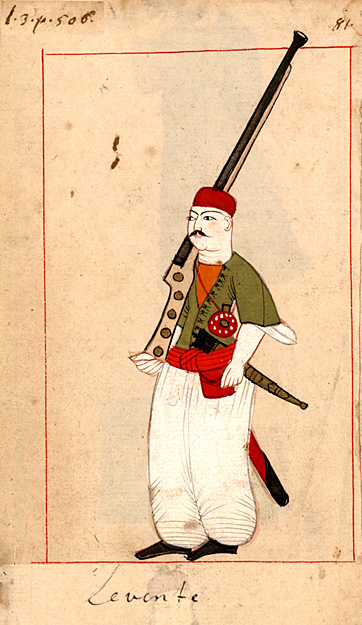Levend on:
[Wikipedia]
[Google]
[Amazon]
 Levend or levendi (
Levend or levendi (
 Levend or levendi (
Levend or levendi (Arabic
Arabic (, ' ; , ' or ) is a Semitic language spoken primarily across the Arab world.Semitic languages: an international handbook / edited by Stefan Weninger; in collaboration with Geoffrey Khan, Michael P. Streck, Janet C. E.Watson; Walter ...
''lawend'') was a name for irregular soldiers. The term originated with the Ottoman Navy, but eventually spread to encompass most irregular troops.
The origin of the term is probably from Italian
Italian(s) may refer to:
* Anything of, from, or related to the people of Italy over the centuries
** Italians, an ethnic group or simply a citizen of the Italian Republic or Italian Kingdom
** Italian language, a Romance language
*** Regional Ita ...
''levanti'', and was used by the Venetians for the various local troops they raised in the coasts of the Balkans
The Balkans ( ), also known as the Balkan Peninsula, is a geographical area in southeastern Europe with various geographical and historical definitions. The region takes its name from the Balkan Mountains that stretch throughout the who ...
, i.e. Christian Greeks, Albanians, and Dalmatians, to serve in the Venetian navy or as auxiliary troops. The Ottomans, who relied on the same manpower pool (eventually along with Muslim Anatolia
Anatolia, tr, Anadolu Yarımadası), and the Anatolian plateau, also known as Asia Minor, is a large peninsula in Western Asia and the westernmost protrusion of the Asian continent. It constitutes the major part of modern-day Turkey. The re ...
n Turks), borrowed the name. Gradually, as the Ottoman navy became more professional, the undisciplined ''levends'' started to be replaced by regular troops. The name however survived as a generic name for naval troops, particularly the riflemen (''tüfekdji''). Thus the Imperial Arsenal
The Imperial Arsenal ( ota, Tersâne-i Âmire) was the main base and naval shipyard of the Ottoman Empire from the 16th century to the end of the Empire. It was located on the Golden Horn in the Ottoman capital, Constantinople (modern Istanbul).
...
in Constantinople
la, Constantinopolis ota, قسطنطينيه
, alternate_name = Byzantion (earlier Greek name), Nova Roma ("New Rome"), Miklagard/Miklagarth (Old Norse), Tsargrad ( Slavic), Qustantiniya (Arabic), Basileuousa ("Queen of Cities"), Megalopolis (" ...
contained two barracks for ''levends''.
Thus in the 17th and 18th centuries, ''levend'' came to refer to irregular mercenaries, mostly infantry but also cavalry, used alongside other terms. Like the mercenaries and condottieri
''Condottieri'' (; singular ''condottiero'' or ''condottiere'') were Italian captains in command of mercenary companies during the Middle Ages and of multinational armies during the early modern period. They notably served popes and other Europ ...
of Western Europe, the ''levend'' formed true "free companies"; their employer was either the Ottoman central government, which was increasingly pressed for fresh troops to match the growing strength of its various neighbours, and to offset the decline of its once-formidable '' kapikulu'' soldiery, or various provincial magnates and governors. A notable aspect of Ottoman mercenaries is that they served away from their home region; thus Albanians
The Albanians (; sq, Shqiptarët ) are an ethnic group and nation native to the Balkan Peninsula who share a common Albanian ancestry, culture, history and language. They primarily live in Albania, Kosovo, North Macedonia, Montenegro, Ser ...
served in the Middle East
The Middle East ( ar, الشرق الأوسط, ISO 233: ) is a geopolitical region commonly encompassing Arabian Peninsula, Arabia (including the Arabian Peninsula and Bahrain), Anatolia, Asia Minor (Asian part of Turkey except Hatay Pro ...
, and Anatolian Turks in Europe or North Africa.
When without employment, however, the ''levends'' often turned to brigandage, and the term quickly came to denote any "vagabond and rascal". At the turn of the 18th century, the Ottoman authorities tried to counter the activities of roving ''levend'' bands by offering them employment in the new military corps of ''deli
Deli may refer to:
* Delicatessen, a shop selling specially prepared food, or food prepared by such a shop
* Sultanate of Deli, a former sultanate in North Sumatra, Indonesia
Places
* Deli, Boyer-Ahmad, a village in Kohgiluyeh and Boyer-Ahmad Pro ...
'' and '' gönüllü''. Later, repeated expeditions were waged against them in Anatolia in 1737, 1747, 1752, 1759, and 1763. Even when they formed part of a governor's retinue, however, they had a reputation for criminal behaviour and licentiousness, as records from the Ottoman provinces and the tales of Western travellers show.
References
Sources
* * * {{cite book, last1=Uyar, first1=Mesut, last2=Erickson, first2=Edward J., title=A Military History of the Ottomans: From Osman to Atatürk, url=https://books.google.com/books?id=JgfNBKHG7S8C&pg=PA63, year=2009, publisher=ABC-CLIO, isbn=978-0-275-98876-0 Ottoman Navy Military units and formations of the Ottoman Empire Irregular units and formations Auxiliary units and formations Mercenary units and formations of the Early Modern era